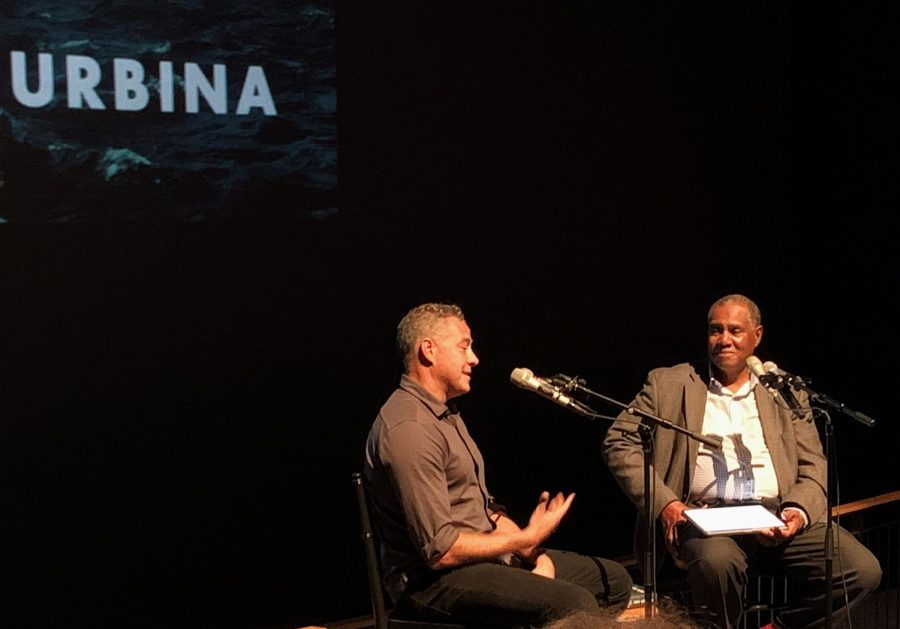Ian Urbina discusses lawlessness on the ocean at New England Aquarium lecture
Ian Urbina, left, discusses his book “The Outlaw Ocean” with journalist Steve Curwood at the New England Aquarium Nov. 5.
November 14, 2019
Ian Urbina, a Pulitzer Prize-winning investigative journalist for The New York Times, discussed his book “The Outlaw Ocean: Journeys Across the Last Untamed Frontier” at the New England Aquarium Nov. 5.
“The Outlaw Ocean” is a first-hand account of the rampant criminal network that exists on the world’s oceans. The oceans, being too vast to police, are filled with traffickers and smugglers, pirates and mercenaries, repo men, vigilante conservationists, elusive poachers, clandestine oil-dumpers, shackled slaves and stowaways.
Public radio program “Living on Earth” hosted the event as part of their “Good Reads on Earth” series where authors of the latest environmental books are interviewed. The show is hosted by radio personality and fellow Pulitzer Prize-winning investigative journalist Steve Curwood. The aquarium itself was also celebrating its 50-year anniversary of rigourous ocean conservation.
Urbina’s reporting covers a diverse range of topics such as illegal overfishing, arms trafficking at sea, human slavery, gun running, intentional dumping, murdering stowaways, thieving of ships and other topics.
This book is the result of three-and-a-half years of news reporting and covers a range of Urbina’s riveting experiences while in the field: being trapped on Thai slave ships illegally fishing along the coast in Somalia, clashing with with a Vietnamese Coast Guard ship in Indonesian waters, being arrested by Norwegian authorities in the Arctic circle, witnessing whales attacking fishing lines in the Antarctic and more.
Before Curwood began the live interview, he first told the audience that he wished to share a few sentiments of his own about the state of our world, our oceans and our humanity.
“70% of the planet is water, and we pay no attention to it. The salinity in here,” Curwood said, pointing to the blood vessels in his forearm, “is the same as our ocean. I have to remember that, although humans believe we are just land creatures, that I’m also a creature of the blue out there.”
Curwood then asked Urbina to elaborate on his decision to name the book “The Outlaw Ocean” and to explain the lawless nature of the ocean.
“It’s not the case that there are no laws, there are lots,” Urbina said. “The laws are only as good as their enforcement, and as it stands there is very little enforcement.”
One of the factors that complicates maritime regulation, Urbina described, is the fact that boats will often have workers who are one nationality, who work for a company of another nationality, whose boat flies the flag of another nationality. The question then stands — which country is the crew supposed to be loyal to?
“The more and more I read the book and listened to [Urbina] speak tonight, the more I realize this is all kind opening a door to the essence of human nature,” said John Duff, an associate professor at the University of Massachusetts Boston’s School for the Environment. “What happens when you put people in a space where laws are murky, and there’s no one around to watch you?”
Urbina described the story he wrote about Rebecca Gomperts, a ship captain and gynecologist who runs Women on Waves, an organization that gives women safe access to abortion in countries where the procedure is illegal and often dangerous. Gomperts achieves this by docking into the ports of those countries and bringing the women onboard, out into international waters. Because she flies the Austrian flag, her boat falls under the jurisdiction of Austrian law — which includes legal abortion. Urbina described this as one of the many ways that people are using maritime laws to their advantage.
Urbina explained that he likes to describe his book as being 50 percent about the environmental impacts of climate change and 50 percent about human/workers’ rights.
He described the way that the workers on many of these boats, especially those for mass fishing, are treated with little to no care or respect for their health or lives. During his journey, a crew member on a boat compared themselves to by-catch: the unwanted creatures that are caught in the net.
“Even if you think you’re eating sustainably fished seafood — and you probably are — it’s also important to consider the creature above the waterline who is instrumental to getting them,” Urbina said.
Urbina discussed the role of the economy in some of the horrifying situations he covered, describing it as a system of “capitalism on steroids” that is more concerned with money than natural life.
“I love learning about the environment, and what I really liked about what he said tonight is all the human aspect stuff: the treatment of workers and the capitalist drive to the bottom,” said Leann Kosior, the account executive at communications company Business Wire. “We should talk more about that.”
For his final question, Curwood asked what consumers and “normal” people can do to address these problems.
“The issue of climate change is so large that trying to fix all of it is like going into war wanting to do everything yourself,” Urbina said. “Choose your battles, the parts of the war, that you feel the most motivated to tackle.”


















